01 Nov2019
By Jacqueline Rodriguez
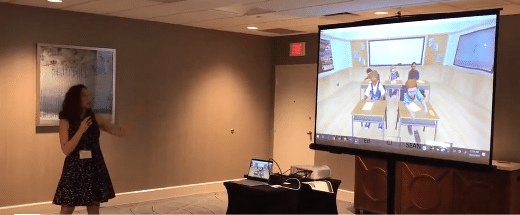 AACTE President and CEO Lynn Gangone and I had the privilege of demonstrating the Association’s commitment to Inquiry and Innovation during a recent visit to New Orleans.
AACTE President and CEO Lynn Gangone and I had the privilege of demonstrating the Association’s commitment to Inquiry and Innovation during a recent visit to New Orleans.
AACTE collaborated with member institution, the University of Central Florida, to present the TeachLivE™ Lab (TLE Lab) to members of Grantmakers for Education during their recent conference in Louisiana. Grantmakers for Education is the nation’s largest and most diverse network of education grantmakers dedicated to improving educational outcomes and increasing opportunities for all learners.
29 Oct2019
By Jacqueline Rodriguez

AACTE is excited to partner with the Educator Preparation Laboratory (EdPrepLab), an initiative of the Learning Policy Institute (LPI) and Bank Street College of Education, to bring a series of webinars to members. Educator preparation programs across the country can access AACTE and EdPrepLab resources to support their teaching, research, and policy in higher education.
In this series of webinars, our members will hear from member institutions, stakeholders, scholars, practitioners, and policymakers as presenters dive into topics that will include addressing social emotional learning, cultural competence, creating inclusive classroom and school environments, and teacher residency models.
We hope you will register for our first webinar on Social and Emotional Learning, Cultural Competence, and Equity in Teacher Preparation that will take place on November 14 at 3:00 p.m ET. The panel of experts include:
25 Oct2019
By Beth Day
The U.S. Department of Education has awarded the Southern Regional Education Board a $5.3 million, 5-year Teacher Quality Partnership grant to create a residency-based teacher preparation program with Georgia College & State University.
The Georgia Residency for Educating Amazing Teachers will recruit undergraduate STEM majors who aspire to become middle grades math and science teachers. They will complete an online Master of Arts in Teaching during a year-long residency—practice teaching supervised by a mentor-teacher— in a high-needs middle grades classroom.
Rural school districts served by the Oconee Regional Education Service Agency in central Georgia will be the primary partners for hosting the residents in classrooms. SREB and Georgia College will support mentor-teachers and residents with coaching and specialized training on topics like project-based learning.
Over the course of the grant, 60 students will become fully certified to teach middle grades math or science in Georgia; some will also complete a computer science endorsement.
The newly certified teachers will then teach in a local school for two years with support from mentor-teachers and SREB instructional coaches. Participants agree to teach in their assigned schools for one year beyond this two-year induction period.
25 Oct2019
By Grant Hayes
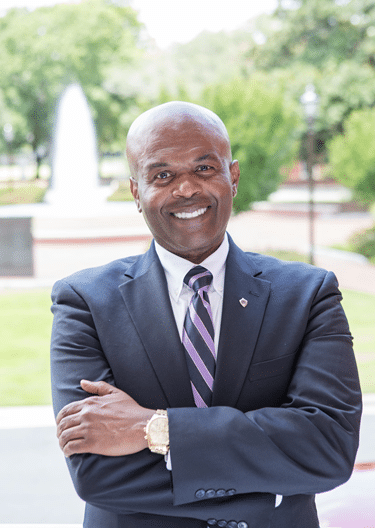 In 2017-18, North Carolina reported 1,618 teacher vacancies. Those represented classrooms that were without a teacher at worst or were without a properly trained teacher at best. At the same time, enrollment in the UNC system’s schools of education has dropped 30% since 2010.
In 2017-18, North Carolina reported 1,618 teacher vacancies. Those represented classrooms that were without a teacher at worst or were without a properly trained teacher at best. At the same time, enrollment in the UNC system’s schools of education has dropped 30% since 2010.
Across the country, teacher shortages are affecting public education. In Oklahoma, the state has issued 3,000 emergency teacher certifications which allow people to begin teaching without education coursework, classroom experience or passing state certification exams. Data collected by the Oklahoma Association of Colleges for Teacher Education shows that emergency-certified teachers are rated lower and leave teaching at a higher rate. We do not want to see this troubling trend happen in North Carolina.
UNC system teacher graduates make up the bulk (37%) of teachers in N.C. public schools. UNC system teacher graduates are more likely to return in years 2-5, showing a commitment to the public schools of N.C. And UNC system science and math teacher graduates outperform teachers prepared in other ways.
In the coming months the East Carolina University College of Education will continue to showcase how we prepare our graduates to be the best in their chosen fields
18 Oct2019
By Toni Molle
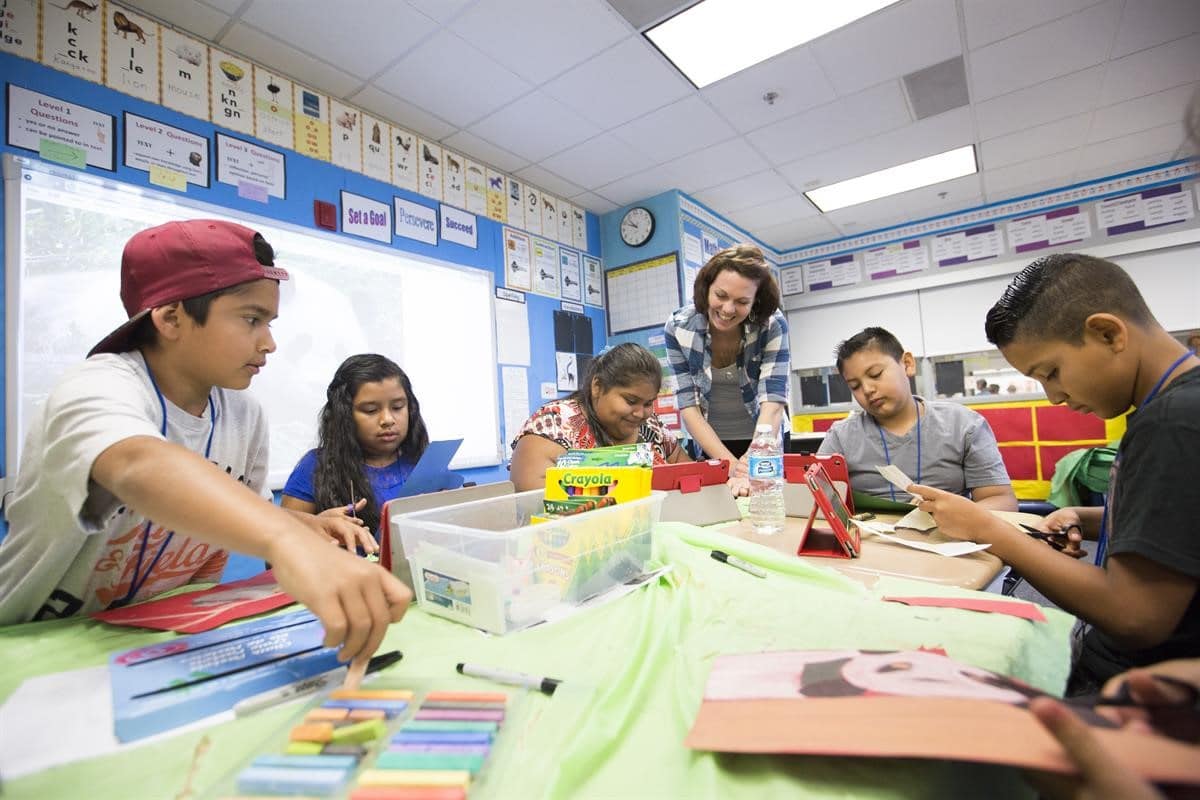
Photo: Courtesy of The California State University
This article and photo originally appeared on The California State University website and are reprinted with permission.
Three California State University (CSU) campuses were awarded nearly $3 million from the U.S. Department of Education’s Teacher Quality Partnership (TQP) program to recruit and prepare science, technology, engineering, mathematics (STEM) and computer science teachers to serve students in low-income and high-need schools throughout the state. California State University campuses in Chico ($1,027,195), Dominguez Hills ($1,028,844) and Monterey Bay ($811,719) have received a total of $2,867,758 in funding for the program.
“Collaboration is a key component among educators,” said Marquita Grenot-Scheyer, assistant vice chancellor for Educator Preparation at the CSU Chancellor’s Office. “By expanding the ongoing collaborative partnerships between the CSU and high-need school districts and through development of engaging STEM and computer science programs, more students will succeed in the classroom.”
18 Oct2019
By Anne Cantrell

Photo by Adrian Sanchez-Gonzalez
This article and photo originally appeared on the Montana State University website and are reprinted with permission.
Montana State University’s Department of Education and its partners have received funding totaling $6.2 million for a program delivered mostly online that is designed to recruit, train and mentor dozens of high-quality educators to work in rural areas of Montana.
The funds include a $3.1 million grant from the U.S. Department of Education and more than $3.1 million in matching funds and services from nearly a dozen partner organizations. They will be used for a five-year project, “Addressing Rural Recruitment and Retention in Montana,” that aims to address a shortage of teachers in rural locations across the state.
“We are excited to provide training and professional development in the first two years of their teaching careers to residents of rural, high-needs communities along with the Montana Office of Public Instruction and our many statewide partners,” said MSU education professor Ann Ewbank, the project’s principal investigator.
“Our common goal is to ensure that every student, from Broadus to Lolo, and from Scobey to Troy, has access to highly effective educators,” Ewbank added. “The Teacher Quality Partnership grant has the potential to strengthen K-12 education in rural communities. When rural schools thrive, Montana thrives.”
15 Oct2019
By Justin Mattingly

This article and photo originally appeared in the Richmond Times-Dispatch and are reprinted with permission.
Calvin Sorrell was the only black male teacher Rodney Robinson had.
He taught in King William County for three dozen years and remembers Robinson as knowledgeable, caring and talented. Robinson was shy, though, lacking many teachers who looked like him.
“The potential was there; he just had to come out a little bit,” Sorrell said. “I knew he always had the ability.”
Robinson looked up to the one black male teacher he did have, who taught him how to play the trombone, baritone and tuba. He became a teacher to give students the teacher he had only once, among other reasons.
“Kids need positive role models,” Sorrell said of being a black male teacher. “It gives them someone to look up to, and he was no exception.”
It surprised him when Robinson became a teacher, but knowing Robinson now, a man driven to improve teacher diversity while getting to know his students, Sorrell was not shocked to find out last week that Robinson is the National Teacher of the Year.
11 Oct2019
By AACTE
The American Association of Colleges for Teacher Education (AACTE) celebrates its 20 member institutions that received the 2019 Teacher Quality Partnership (TQP) grants from the U.S. Department of Education announced last week. With grants totaling more than $20 million, the TQP is the only federal initiative dedicated to strengthening educator preparation at institutions of higher education.
“AACTE celebrates all of the grant recipients, especially our 20 AACTE member institutions, because our members work year-round to advocate for continual funding for this critical initiative,” said Lynn M. Gangone, AACTE president and CEO. “With so much volatility on Capitol Hill, we view the consensus to support teacher preparation programs as a huge victory. TQP grants empower our members to extend and elevate their innovative and exemplary work.”
11 Oct2019
By Joanna Norris
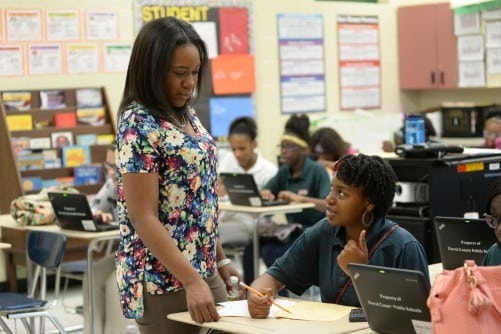
The University of North Florida’s College of Education and Human Services was awarded a $1.6 million Teacher Quality Partnership (TQP) grant from the U.S. Department of Education to support innovative teacher preparation models that prepare prospective and new teachers to serve students in high-need schools.
The Department of Education made 31 awards totaling $20.1 million, and UNF was the only university in Florida to receive the funding. Recipients include more than two dozen school districts, institutions of higher education, and nonprofit organizations.
“We know a great teacher is the foundation of a great education,” said U.S. Secretary of Education Betsy DeVos. “By ensuring teachers are able to continually grow and improve in ways that excite and challenge them, we can help students succeed. These grants will help foster meaningful professional development opportunities, especially in the often-lacking areas of STEM and computer science-focused training.”
11 Oct2019
By Annemarie Mountz

A team of Penn State College of Education faculty led by P. Karen Murphy has won a five-year, $1.98 million grant from the National Science Foundation (NSF) to improve the preparation of undergraduate preservice elementary teachers.
Murphy, distinguished professor of education (educational psychology), is the principal investigator (PI) on the study. She is joined by co-PIs Gwendolyn Lloyd, the Henry J. Hermanowicz Professor of Teacher Education and professor of education (mathematics education); Amy Voss Farris, assistant professor of education (science education); and Rachel Wolkenhauer, assistant professor of education (curriculum and supervision).
With support from the NSF Improving Undergraduate STEM Education Program: Education and Human Resources, this project aims to serve the national interest by investigating whether teaching preservice elementary teachers how to use discussion-based pedagogy improves the quality of mathematics instruction in their classrooms. Specifically, the researchers will adapt Quality Talk (QT), a small-group, teacher-facilitated discussion approach, for use by teacher educators in STEM methods courses and classroom-based field experiences for future elementary teachers.
07 Oct2019
By Deborah Koolbeck
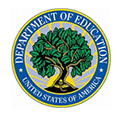 The U.S. Department of Education announced its new Teacher Quality Partnership (TQP), grant recipients, funding 31 projects with $20.1 million dollars. TQP is the only federal initiative dedicated to strengthening and transforming educator preparation at institutions of higher education. Of the 31 grantees, 20 are AACTE members.
The U.S. Department of Education announced its new Teacher Quality Partnership (TQP), grant recipients, funding 31 projects with $20.1 million dollars. TQP is the only federal initiative dedicated to strengthening and transforming educator preparation at institutions of higher education. Of the 31 grantees, 20 are AACTE members.
The grant program addresses the teacher shortage found across the nation by preparing teachers in high needs fields to teach in high need schools. Grantees focus on either the undergraduate or graduate level, extending clinical practice to a full year or creating a residency program. Graduates receive at least 2 years of induction, which research shows supports teachers in remaining in the classroom after their novice years. In fact, a majority of TQP graduates remain in the profession well after the provided induction and drive transformation throughout their schools and even the school district itself.
For this grant competition, priority was given to those applicants who designed programs to prepare computer science teachers as well as the STEM fields overall, and to those programs taking place in a Qualified Opportunity Zone as designated by the Internal Revenue Service.
AACTE annually advocates for TQP funding through the congressional appropriations process, and supports augmenting the capacity and reach of this grant.
The list of awardees can be found in the Department’s press release.
07 Oct2019
By Danny Carlson
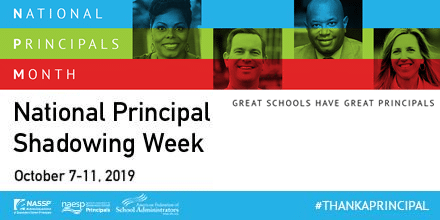
October is National Principals Month —a month to honor our nation’s principals and the important work they do leading schools. Led by the National Association of Elementary School Principals (NAESP), the National Association of Secondary School Principals (NASSP), and the American Federation of School Administrators (AFSA), this annual celebration recognizes our nation’s principals for their tireless dedication to their students and the schools they serve.
To effectively lead a school, today’s principal must fulfill the role of instructional leader and create the learning conditions to support teaching and learning. To do this, principals are in classrooms, observing instruction, engaging with teachers in the nuts-and-bolts of leading learning communities, and connecting teachers with professional learning opportunities. Thus, principals are now more than ever multipliers of effective teaching and possess an enormous capacity to impact student achievement.
Simply put: You can’t have a great school without a great principal. Whether it’s supporting their teachers, ensuring students have access to nutritious meals, or making parents and families feel engaged and welcome their child’s school, principals make it happen.
Despite the many rewarding aspects of the principalship and its importance in improving teaching quality and boosting student outcomes,
03 Oct2019
By Paul Floeckher
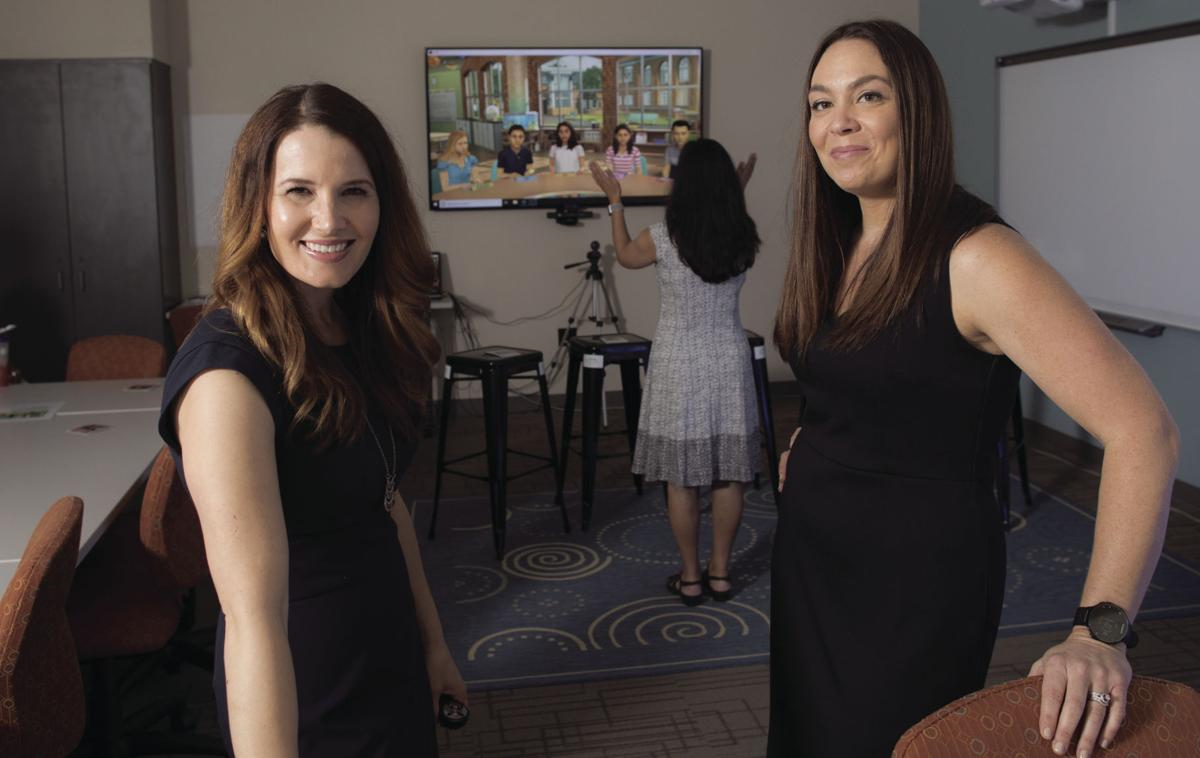
This article and photo originally appeared in Cobb Life Magazine and are reprinted with permission.
Teachers encounter all sorts of situations when they’re instructing students in the classroom, and the Bagwell College of Education at Kennesaw State University is taking an animated approach to preparing teacher candidates for scenarios they will experience as educators.
Bagwell has a new laboratory where KSU students and faculty utilize mixed-reality technology to interact with avatars of children and adults, simulating a variety of situations and challenges teachers can encounter. The student avatars each have their own unique personalities, and the scenarios have low, medium and high settings requiring varying levels of problem-solving.
“The lab’s capabilities are endless for providing purposeful practice for teacher candidates before they ever step foot in a classroom,” said Kate Zimmer, interim chair of the Department of Inclusive Education and an associate professor of special education.
03 Oct2019
By JTE Insider

Read the latest JTE Insider blog interview by the Journal of Teacher Education (JTE) editorial team member Lauren Snead. This blog is available to the public, and AACTE members have free access to the articles in the JTE online archives—just log in with your AACTE profile.
This interview features insights from the article “Rethinking Student Teacher Feedback: Using a Self-Assessment Resource With Student Teachers” by Lauren Oropeza Snead and H. Jerome Freiberg. The article was published in the March/April 2019 issue of the JTE.
Q1. What motivated you to pursue this particular research topic?
As a doctoral student in Dr. Jerome Freiberg’s graduate class, I was challenged to self-assess my own teaching by using student feedback. This was an area of growth I had not previously explored and it completely changed the way I looked at my teaching. As I briefly discuss in the article, I had spent many years as a K-12 teacher, where I focused on what administrators thought of me. Up until this point, my teaching evaluations dictated how I taught my class. I based any areas of growth or changes on what the administrators said about my classroom. Now that I look back, I cannot believe how blind I was to all of the potential feedback perspectives in classrooms. Using Dr. Freiberg’s self-assessment resource, the Person-Centered Learning Assessment (PCLA), I realized for the first time that the power for change started with my students. Accessing student feedback gave me a fresh perspective into areas of growth. It was an empowering experience. That experience spurred on my curiosity to dive further into the PCLA.
02 Oct2019
By Valerie Owens
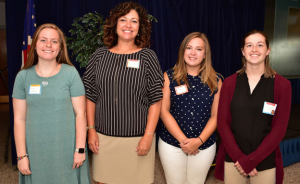 Shepherd University’s School of Education received a $40,635 grant from the West Virginia Department of Education to continue working with five Berkeley County Schools providing professional development and to start a pilot program in which a select group of Shepherd student teachers spend the entire school year in a Berkeley County elementary school.
Shepherd University’s School of Education received a $40,635 grant from the West Virginia Department of Education to continue working with five Berkeley County Schools providing professional development and to start a pilot program in which a select group of Shepherd student teachers spend the entire school year in a Berkeley County elementary school.
“The teacher candidate goes in from day one and works with the mentor teacher in co-planning, co-teaching, and co-assessing,” said Dori Hargrove, Shepherd’s elementary specialization coordinator. “By being involved from the first day, the teacher candidate gets a better understanding of all the decisions that go into planning. It helps the teacher candidate feel more prepared and helps the mentor teacher learn new strategies.”
Four Shepherd elementary education majors are participating in the pilot program—Kristin Williams, Charles Town; Susan Stambaugh, Martinsburg; Kayla Shultz, Falling Waters; and Alexis Shearer, Chambersburg, Pennsylvania. The typical length of time for student teaching is 14 weeks; however, the four are co-teaching in a school the entire year.
 AACTE President and CEO Lynn Gangone and I had the privilege of demonstrating the Association’s commitment to Inquiry and Innovation during a recent visit to New Orleans.
AACTE President and CEO Lynn Gangone and I had the privilege of demonstrating the Association’s commitment to Inquiry and Innovation during a recent visit to New Orleans.







 In 2017-18, North Carolina reported 1,618 teacher vacancies. Those represented classrooms that were without a teacher at worst or were without a properly trained teacher at best. At the same time, enrollment in the UNC system’s schools of education has dropped 30% since 2010.
In 2017-18, North Carolina reported 1,618 teacher vacancies. Those represented classrooms that were without a teacher at worst or were without a properly trained teacher at best. At the same time, enrollment in the UNC system’s schools of education has dropped 30% since 2010.




 The U.S. Department of Education announced its new
The U.S. Department of Education announced its new 

 Shepherd University’s School of Education received a $40,635 grant from the West Virginia Department of Education to continue working with five Berkeley County Schools providing professional development and to start a pilot program in which a select group of Shepherd student teachers spend the entire school year in a Berkeley County elementary school.
Shepherd University’s School of Education received a $40,635 grant from the West Virginia Department of Education to continue working with five Berkeley County Schools providing professional development and to start a pilot program in which a select group of Shepherd student teachers spend the entire school year in a Berkeley County elementary school.